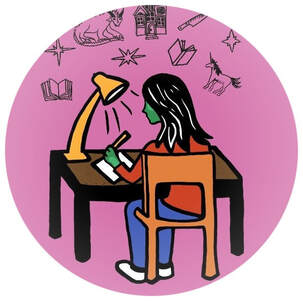Welcome!
Alone in a Room is my monthly writing newsletter, featuring craft musings, original writing prompts, what I'm reading and thinking about, upcoming events, and general inspirational/literary goodness! It's free to subscribe, and you'll receive the latest issue delivered direct to your inbox! (If you don't see it, make sure to check spam & promotions folders.)
Why "Alone in a Room"?
Why "Alone in a Room"?: The title of this newsletter refers to Michael Ventura's essay, "The Talent of the Room" (read asap if you haven't!) - in which Ventura describes the kind of talent needed most in order to be a writer: the ability to sit, for many hours, day after day, alone in a room. Of course, Ventura's concept of a room is mostly symbolic and can be tweaked in any number of ways - perhaps you like to write in a crowded coffee shop or at the dining room table? - but the idea remains the same: we writers must get comfortable with self-imposed aloneness; we must face ourselves on the blank page again and again if we wish to write. No one - no matter how much we love them or look up to them - can do this work for us or make it any easier. Looking beyond this requisite aloneness writers need in order to create, the phrase also conjures up the Tibetan story of The Room of One Thousand Demons: all of us, in life, are alone in a room too. You could think of this metaphorical room as our bodies, our minds, or the various conditions of each of our lives. The room is full of many different things, often our worst fears, challenges, tests we are given again and again, people and situations that keep showing up until we learn from them, and despite others around us - the very real and powerful presences of loved ones, friends, and community - each of us is still traveling through our respective rooms (lives) alone, in that the fundamental choices we make - the fears we face, whether we grow or shrink or get curious or resistant - are our choices alone. No one can do this work for us. And while I ultimately believe we are all deeply connected in more ways than we can perceive, the reality is that the human experience - from whatever angle you look at it - is often about trying to transcend our own initial separateness, about navigating the world from an unshared viewpoint. Our starting point - both in life and in writing - is that we are first alone in a room.

